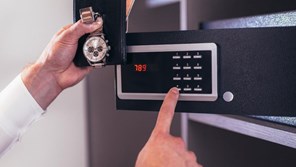How to keep money safe at home
5 minute read

Whatever your reason for keeping cash in your home, it’s important that it remains safe. This guide covers practical tips and insights on the best ways to secure your money at home.

Age Co Insurance
We offer products and services to help the over 50s get more out of later life and give our profits to the charity Age UK.
Many people keep cash at home. However, if you choose to keep a considerable amount at home, even for a couple of days, it’s important to choose a protected place that keeps theft, fire or flood damage in mind. Here we offer tips on how to best protect your money at home.
Where to store money at home
While it’s generally advisable to keep large sums in a bank or building society, some situations call for keeping cash at home. For example, those who are less able or find it difficult to travel may opt to keep money physically close.
In such cases, it’s important to note the risks involved and identify sensible storage options.
Risks to bear in mind when storing money at home:
- Theft
- Fire
- Flood damage
Over time, you will also miss out on monetary increases, since you won't be earning any interest on your money.

For significant amounts of money (£100 or more), you'll want to place your money in a secure place.
Secure places you could use for your money:
- Locked drawers
- A lockable bureau
- A secure filing cabinet
- Fireproof lock boxes
- A good-quality safe
Selecting the right safe for your money and other valuables
If you also have other valuable items such as jewellery, watches or official documentation that needs to be kept secure, investing in a good-quality safe is a wise choice.
A safe’s cash rating indicates its level of security and whether it can protect your valuables from fire and water damage. The higher a safe’s cash rating, the better quality of protection the safe will offer, which means an insurance company will be willing to cover higher amounts of cash kept inside. Ratings are determined by the thickness of the safe walls, how many locks are included, as well as the quality of those locks.
For smaller amounts, a safe may not be necessary. However, it’s still important to find a sensible and secure storage location.
How much money can you keep at home legally?
At the time of writing, there was no legal limit on how much money you can keep in your home. However, the impracticality of keeping large amounts of money safe and secure may outweigh the perceived benefits.
Does home insurance cover cash?
Most home insurance policies cover cash as part of your contents cover, although there are coverage limits. In the event of theft, fire or water damage, you may need to provide evidence of the stored amount, the reason for storing it and its location within your home. Your insurance provider will assess the claim based on policy limits and any potential negligence.
In most cases, money you keep at home in a locked place should be covered by your insurance - though it is worth double-checking before storing large amounts in your home.
Learn more about finding home insurance through Age Co here.
Summary
If you're considering keeping a significant amount of money in your home (£100 or more), consider these safety tips:
- Storing your money at home will put it at risk of theft, fire, and flood damage. You should also consider the interest payments you'll miss out on.
- At a minimum, your money should be kept somewhere you can lock, such as a locked drawer, secure filing cabinet, or lockbox.
- Safes can offer the best protection and house other valuables, such as jewellery. The higher a safe’s cash rating, the better quality of protection.
- Contents insurance can cover money stored at home, though there may be limits to how much you can insure. Therefore, it is always worth talking to your provider to confirm whether your policy is right.

Sign up to the Age Co Newsletter
Each month, our email newsletter delivers inspiring stories, practical guides to later life, plus the latest news about Age Co and the charitable work we support.
